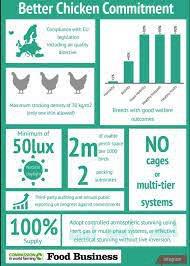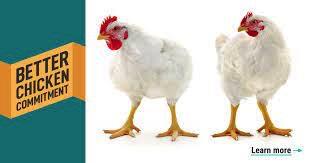 In 2016, approximately 125 national restaurant chains signed on to the Better Chicken Commitment (BCC). The initiative was established by animal welfare advocacy groups including the Humane Society of the United States supported by kindred organizations The promoters of the BCC are totally opposed to all forms of livestock production and advocate a vegan agenda.
In 2016, approximately 125 national restaurant chains signed on to the Better Chicken Commitment (BCC). The initiative was established by animal welfare advocacy groups including the Humane Society of the United States supported by kindred organizations The promoters of the BCC are totally opposed to all forms of livestock production and advocate a vegan agenda.
Adoption of the BCC requires an extended growing period, inferior feed conversion, effectively higher mortality and diminished efficiency and use of resources. The BCC imposes higher costs on restaurants, food service companies and ultimately on consumers.
Driven by economic factors and facilitated by advances in genetic selection matched by improved nutrition and flock health, the U.S. broiler industry is among the most advanced in the world. Adoption of the Better Chicken Commitment would be a retrograde step and the failure of signatories to the 2016 pledges to follow through confirms that the system has little support from price-conscious consumers and those prioritizing sustainability.
The National Chicken Council correctly maintains that, “If consumers are truly interested and willing to pay for chicken that was raised according to the Better Chicken Commitment standards, they should be afforded the option.”

The same could be said for cage-free eggs. The same organizations promoting the BCC coerced retailers into agreeing to transition to cage-free product by 2025. At the present time, only one-third of U.S. eggs are derived from other than conventional cages with no likelihood of attaining a total cage-free goal. Consumers in states that have mandated sale of only cage-free eggs following HSUS motivated ballot initiatives are now paying what is referred to as the “Pacelle Tax” with higher prices than states that allow free choice among housing systems.
The National Chicken Council and the United Egg Producers have clearly documented standards for all aspects of housing and production developed by panels of scientists with expertise in the fields of welfare, health and management and enforced by rigorous auditing. The Better Chicken Commitment has had its opportunity to reform broiler production, but consumer sentiment, economics, practicality and reality have limited adoption. The same can be said for the recent slowing in transition to alternatives to conventional cages that offer advantages in price and sustainability